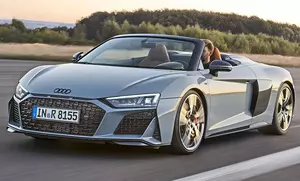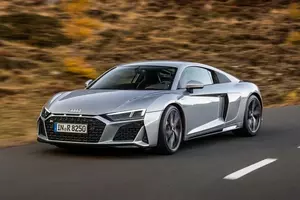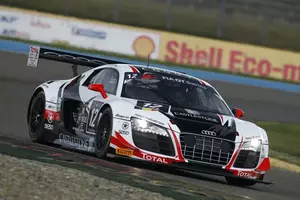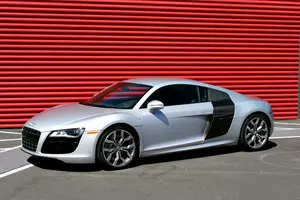
| Vehicle | Precise engine size | Difference from world average | Engine size to consumption ratio | Horsepower from 1 L | Engine size to 100 kg of weight |
|---|---|---|---|---|---|
| 5.2 FSI V10 |
5.2 L (5204 cc) |
121.8% bigger | 289 cc to 1 mpg | 104 hp from 1 L | 306 cc to 100 kg |
| Performance 5.2 FSI V10 |
5.2 L (5204 cc) |
121.8% bigger | 289 cc to 1 mpg | 119 hp from 1 L | 306 cc to 100 kg |
| Vehicle | 5.2 FSI V10 |
|---|---|
| Precise engine size | 5.2 L (5204 cc) |
| Difference from world average | 121.8 bigger |
| Engine size to consumption ratio | 289 cc to 1 mpg |
| Horsepower from 1 L | 104 hp from 1 L |
| Engine size to 100 kg of weight | 306 cc to 100 kg |
| Vehicle | Performance 5.2 FSI V10 |
| Precise engine size | 5.2 L (5204 cc) |
| Difference from world average | 121.8 bigger |
| Engine size to consumption ratio | 289 cc to 1 mpg |
| Horsepower from 1 L | 119 hp from 1 L |
| Engine size to 100 kg of weight | 306 cc to 100 kg |

| Vehicle | Precise engine size | Difference from world average | Engine size to consumption ratio | Horsepower from 1 L | Engine size to 100 kg of weight |
|---|---|---|---|---|---|
| GT3 5.2 V10 |
5.2 L (5200 cc) |
121.7% bigger | - | 113 hp from 1 L | 433 cc to 100 kg |
| Vehicle | GT3 5.2 V10 |
|---|---|
| Precise engine size | 5.2 L (5200 cc) |
| Difference from world average | 121.7 bigger |
| Engine size to consumption ratio | - |
| Horsepower from 1 L | 113 hp from 1 L |
| Engine size to 100 kg of weight | 433 cc to 100 kg |

| Vehicle | Precise engine size | Difference from world average | Engine size to consumption ratio | Horsepower from 1 L | Engine size to 100 kg of weight |
|---|---|---|---|---|---|
| 5.2 FSI V10 |
5.2 L (5204 cc) |
121.8% bigger | 289 cc to 1 mpg | 104 hp from 1 L | 325 cc to 100 kg |
| Performance 5.2 FSI V10 |
5.2 L (5204 cc) |
121.8% bigger | 289 cc to 1 mpg | 119 hp from 1 L | 325 cc to 100 kg |
| Vehicle | 5.2 FSI V10 |
|---|---|
| Precise engine size | 5.2 L (5204 cc) |
| Difference from world average | 121.8 bigger |
| Engine size to consumption ratio | 289 cc to 1 mpg |
| Horsepower from 1 L | 104 hp from 1 L |
| Engine size to 100 kg of weight | 325 cc to 100 kg |
| Vehicle | Performance 5.2 FSI V10 |
| Precise engine size | 5.2 L (5204 cc) |
| Difference from world average | 121.8 bigger |
| Engine size to consumption ratio | 289 cc to 1 mpg |
| Horsepower from 1 L | 119 hp from 1 L |
| Engine size to 100 kg of weight | 325 cc to 100 kg |

| Vehicle | Precise engine size | Difference from world average | Engine size to consumption ratio | Horsepower from 1 L | Engine size to 100 kg of weight |
|---|---|---|---|---|---|
| 5.2 FSI V10 |
5.2 L (5200 cc) |
121.7% bigger | - | 113 hp from 1 L | 433 cc to 100 kg |
| GT4 V10 |
5.2 L (5200 cc) |
121.7% bigger | - | 95 hp from 1 L | 347 cc to 100 kg |
| Vehicle | 5.2 FSI V10 |
|---|---|
| Precise engine size | 5.2 L (5200 cc) |
| Difference from world average | 121.7 bigger |
| Engine size to consumption ratio | - |
| Horsepower from 1 L | 113 hp from 1 L |
| Engine size to 100 kg of weight | 433 cc to 100 kg |
| Vehicle | GT4 V10 |
| Precise engine size | 5.2 L (5200 cc) |
| Difference from world average | 121.7 bigger |
| Engine size to consumption ratio | - |
| Horsepower from 1 L | 95 hp from 1 L |
| Engine size to 100 kg of weight | 347 cc to 100 kg |

| Vehicle | Precise engine size | Difference from world average | Engine size to consumption ratio | Horsepower from 1 L | Engine size to 100 kg of weight |
|---|---|---|---|---|---|
| 5.2 FSI V10 |
5.2 L (5204 cc) |
121.8% bigger | 274 cc to 1 mpg | 117 hp from 1 L | 306 cc to 100 kg |
| Vehicle | 5.2 FSI V10 |
|---|---|
| Precise engine size | 5.2 L (5204 cc) |
| Difference from world average | 121.8 bigger |
| Engine size to consumption ratio | 274 cc to 1 mpg |
| Horsepower from 1 L | 117 hp from 1 L |
| Engine size to 100 kg of weight | 306 cc to 100 kg |

| Vehicle | Precise engine size | Difference from world average | Engine size to consumption ratio | Horsepower from 1 L | Engine size to 100 kg of weight |
|---|---|---|---|---|---|
| 5.2 FSI V10 |
5.2 L (5204 cc) |
121.8% bigger | 248 cc to 1 mpg | 104 hp from 1 L | 325 cc to 100 kg |
| 5.2 FSI V10 plus |
5.2 L (5204 cc) |
121.8% bigger | 274 cc to 1 mpg | 117 hp from 1 L | 325 cc to 100 kg |
| Vehicle | 5.2 FSI V10 |
|---|---|
| Precise engine size | 5.2 L (5204 cc) |
| Difference from world average | 121.8 bigger |
| Engine size to consumption ratio | 248 cc to 1 mpg |
| Horsepower from 1 L | 104 hp from 1 L |
| Engine size to 100 kg of weight | 325 cc to 100 kg |
| Vehicle | 5.2 FSI V10 plus |
| Precise engine size | 5.2 L (5204 cc) |
| Difference from world average | 121.8 bigger |
| Engine size to consumption ratio | 274 cc to 1 mpg |
| Horsepower from 1 L | 117 hp from 1 L |
| Engine size to 100 kg of weight | 325 cc to 100 kg |

| Vehicle | Precise engine size | Difference from world average | Engine size to consumption ratio | Horsepower from 1 L | Engine size to 100 kg of weight |
|---|---|---|---|---|---|
| 5.2 FSI V10 |
5.2 L (5200 cc) |
121.7% bigger | - | 110 hp from 1 L | 400 cc to 100 kg |
| Vehicle | 5.2 FSI V10 |
|---|---|
| Precise engine size | 5.2 L (5200 cc) |
| Difference from world average | 121.7 bigger |
| Engine size to consumption ratio | - |
| Horsepower from 1 L | 110 hp from 1 L |
| Engine size to 100 kg of weight | 400 cc to 100 kg |

| Vehicle | Precise engine size | Difference from world average | Engine size to consumption ratio | Horsepower from 1 L | Engine size to 100 kg of weight |
|---|---|---|---|---|---|
| 5.2 FSI V10 |
5.2 L (5204 cc) |
121.8% bigger | 289 cc to 1 mpg | 101 hp from 1 L | 325 cc to 100 kg |
| 5.2 FSI V10 plus |
5.2 L (5204 cc) |
121.8% bigger | 289 cc to 1 mpg | 106 hp from 1 L | 325 cc to 100 kg |
| 4.2 FSI V8 |
4.16 L (4163 cc) |
77.5% bigger | 219 cc to 1 mpg | 103 hp from 1 L | 260 cc to 100 kg |
| Vehicle | 5.2 FSI V10 |
|---|---|
| Precise engine size | 5.2 L (5204 cc) |
| Difference from world average | 121.8 bigger |
| Engine size to consumption ratio | 289 cc to 1 mpg |
| Horsepower from 1 L | 101 hp from 1 L |
| Engine size to 100 kg of weight | 325 cc to 100 kg |
| Vehicle | 5.2 FSI V10 plus |
| Precise engine size | 5.2 L (5204 cc) |
| Difference from world average | 121.8 bigger |
| Engine size to consumption ratio | 289 cc to 1 mpg |
| Horsepower from 1 L | 106 hp from 1 L |
| Engine size to 100 kg of weight | 325 cc to 100 kg |
| Vehicle | 4.2 FSI V8 |
| Precise engine size | 4.16 L (4163 cc) |
| Difference from world average | 77.5 bigger |
| Engine size to consumption ratio | 219 cc to 1 mpg |
| Horsepower from 1 L | 103 hp from 1 L |
| Engine size to 100 kg of weight | 260 cc to 100 kg |

| Vehicle | Precise engine size | Difference from world average | Engine size to consumption ratio | Horsepower from 1 L | Engine size to 100 kg of weight |
|---|---|---|---|---|---|
| 4.2 FSI V8 |
4.16 L (4163 cc) |
77.5% bigger | 260 cc to 1 mpg | 103 hp from 1 L | 245 cc to 100 kg |
| 5.2 FSI V10 |
5.2 L (5204 cc) |
121.8% bigger | 289 cc to 1 mpg | 101 hp from 1 L | 306 cc to 100 kg |
| Vehicle | 4.2 FSI V8 |
|---|---|
| Precise engine size | 4.16 L (4163 cc) |
| Difference from world average | 77.5 bigger |
| Engine size to consumption ratio | 260 cc to 1 mpg |
| Horsepower from 1 L | 103 hp from 1 L |
| Engine size to 100 kg of weight | 245 cc to 100 kg |
| Vehicle | 5.2 FSI V10 |
| Precise engine size | 5.2 L (5204 cc) |
| Difference from world average | 121.8 bigger |
| Engine size to consumption ratio | 289 cc to 1 mpg |
| Horsepower from 1 L | 101 hp from 1 L |
| Engine size to 100 kg of weight | 306 cc to 100 kg |

| Vehicle | Precise engine size | Difference from world average | Engine size to consumption ratio | Horsepower from 1 L | Engine size to 100 kg of weight |
|---|---|---|---|---|---|
| GT 5.2 FSI V10 |
5.2 L (5204 cc) |
121.8% bigger | 306 cc to 1 mpg | 108 hp from 1 L | 325 cc to 100 kg |
| 5.2 FSI V10 |
5.2 L (5204 cc) |
121.8% bigger | 306 cc to 1 mpg | 101 hp from 1 L | 306 cc to 100 kg |
| 4.2 FSI V8 |
4.16 L (4163 cc) |
77.5% bigger | 260 cc to 1 mpg | 103 hp from 1 L | 245 cc to 100 kg |
| Vehicle | GT 5.2 FSI V10 |
|---|---|
| Precise engine size | 5.2 L (5204 cc) |
| Difference from world average | 121.8 bigger |
| Engine size to consumption ratio | 306 cc to 1 mpg |
| Horsepower from 1 L | 108 hp from 1 L |
| Engine size to 100 kg of weight | 325 cc to 100 kg |
| Vehicle | 5.2 FSI V10 |
| Precise engine size | 5.2 L (5204 cc) |
| Difference from world average | 121.8 bigger |
| Engine size to consumption ratio | 306 cc to 1 mpg |
| Horsepower from 1 L | 101 hp from 1 L |
| Engine size to 100 kg of weight | 306 cc to 100 kg |
| Vehicle | 4.2 FSI V8 |
| Precise engine size | 4.16 L (4163 cc) |
| Difference from world average | 77.5 bigger |
| Engine size to consumption ratio | 260 cc to 1 mpg |
| Horsepower from 1 L | 103 hp from 1 L |
| Engine size to 100 kg of weight | 245 cc to 100 kg |

| Vehicle | Precise engine size | Difference from world average | Engine size to consumption ratio | Horsepower from 1 L | Engine size to 100 kg of weight |
|---|---|---|---|---|---|
| 4.2 FSI V8 |
4.16 L (4163 cc) |
77.5% bigger | 260 cc to 1 mpg | 101 hp from 1 L | 260 cc to 100 kg |
| GT 5.2 V10 |
5.2 L (5204 cc) |
121.8% bigger | 306 cc to 1 mpg | 108 hp from 1 L | 347 cc to 100 kg |
| 5.2 FSI V10 |
5.2 L (5204 cc) |
121.8% bigger | 306 cc to 1 mpg | 101 hp from 1 L | 325 cc to 100 kg |
| Vehicle | 4.2 FSI V8 |
|---|---|
| Precise engine size | 4.16 L (4163 cc) |
| Difference from world average | 77.5 bigger |
| Engine size to consumption ratio | 260 cc to 1 mpg |
| Horsepower from 1 L | 101 hp from 1 L |
| Engine size to 100 kg of weight | 260 cc to 100 kg |
| Vehicle | GT 5.2 V10 |
| Precise engine size | 5.2 L (5204 cc) |
| Difference from world average | 121.8 bigger |
| Engine size to consumption ratio | 306 cc to 1 mpg |
| Horsepower from 1 L | 108 hp from 1 L |
| Engine size to 100 kg of weight | 347 cc to 100 kg |
| Vehicle | 5.2 FSI V10 |
| Precise engine size | 5.2 L (5204 cc) |
| Difference from world average | 121.8 bigger |
| Engine size to consumption ratio | 306 cc to 1 mpg |
| Horsepower from 1 L | 101 hp from 1 L |
| Engine size to 100 kg of weight | 325 cc to 100 kg |